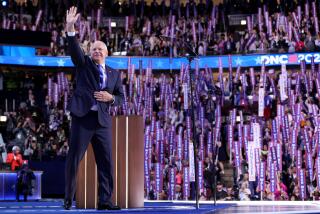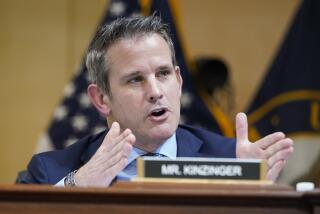Ron Paul delegates stir presidential unrest at GOP convention
- Share via
TAMPA, Fla. -- As much as Mitt Romney might wish it, Ron Paul just won’t go away.
Paul, the Texas congressman with a passionate, libertarian-leaning following, created a stir Tuesday when he made two swings through the floor of the Republican National Committee, shaking hands and greeting supporters -- acting, in short, like a candidate for president. Perhaps more significantly, pro-Paul delegates announced that they had submitted nomination forms from six states that could require that his name be placed in nomination alongside Romney’s.
Romney forces have been trying to fend off a vote that would include Paul, fearing that he would take the focus off the presumptive nominee and showcase divisions in the party.
PHOTOS: Scenes from the GOP convention
According to the chairman of the Nevada delegation, Wayne Terhune, his state, along with at least four others, submitted nomination papers for Paul on Tuesday afternoon. He said current party rules require that five states submit nominating papers in order for a candidate’s name to be placed in nomination. There were various accounts about which states were included, but they apparently included Maine. However, the party announced that it would not be seating all the delegates from Maine, causing pockets of the arena to erupt in chants of, “Seat them now!”
Gary Heyer, a delegate from Minnesota, confirmed that his state was among those submitting papers showing a majority of delegates favoring Paul. Their goal, he said, is simply “to get him into nomination, so everybody here has a choice. If they vote for Romney and he’s democratically elected, then he’s democratically elected. We just want a choice.”
Ron Paul delegates have been fighting a rule change that would require future candidates to have support from eight states, not five, to have their names placed in nomination.
The tussle was part of a larger fight involving Paul forces and others who were fighting a rules change that would give the party establishment a greater voice in the choice of future delegates.
Follow Politics Now on Twitter and Facebook
mitchell.landsberg@latimes.com
Twitter: @latlands
More to Read
Get the L.A. Times Politics newsletter
Deeply reported insights into legislation, politics and policy from Sacramento, Washington and beyond. In your inbox twice per week.
You may occasionally receive promotional content from the Los Angeles Times.









